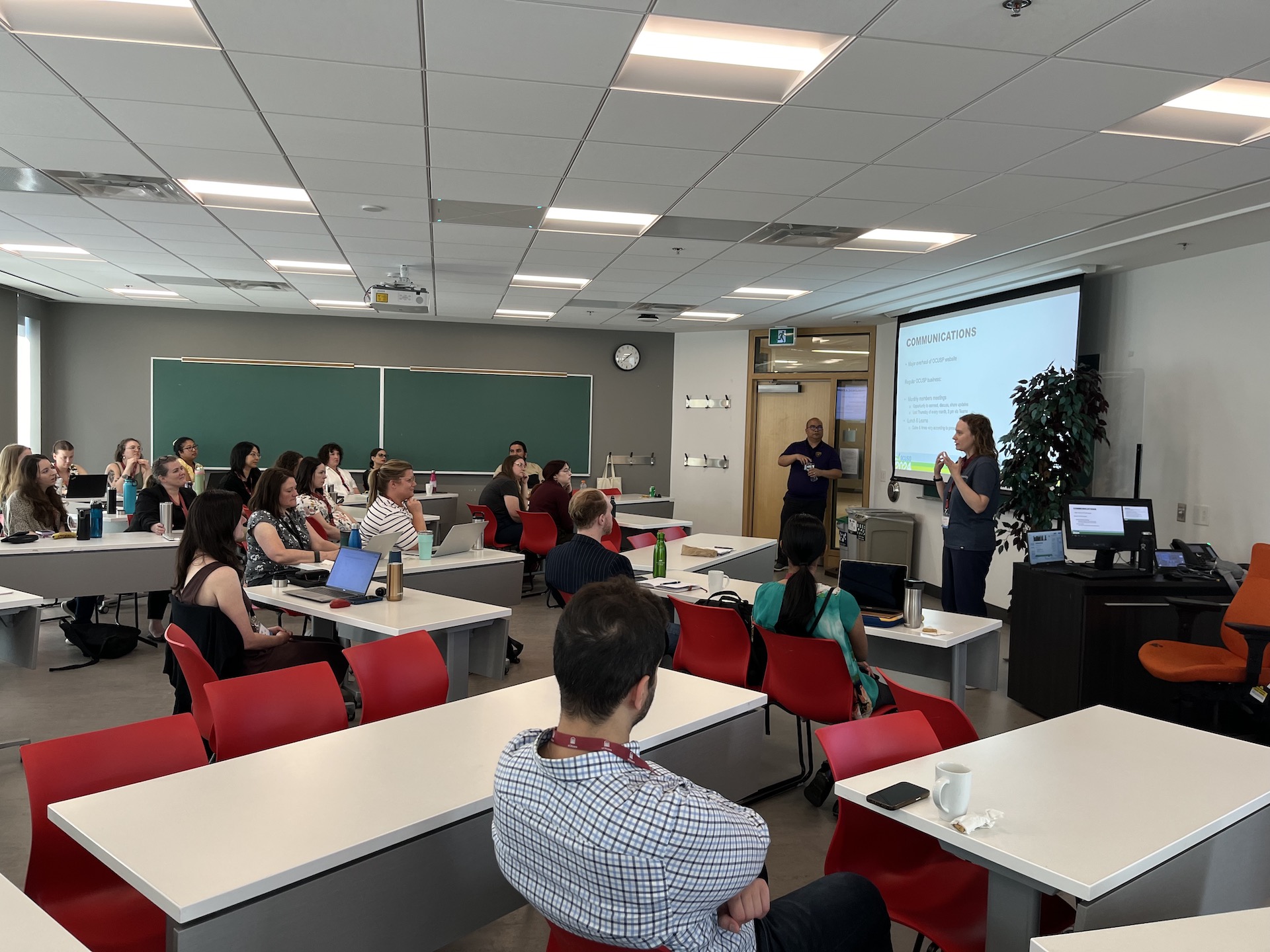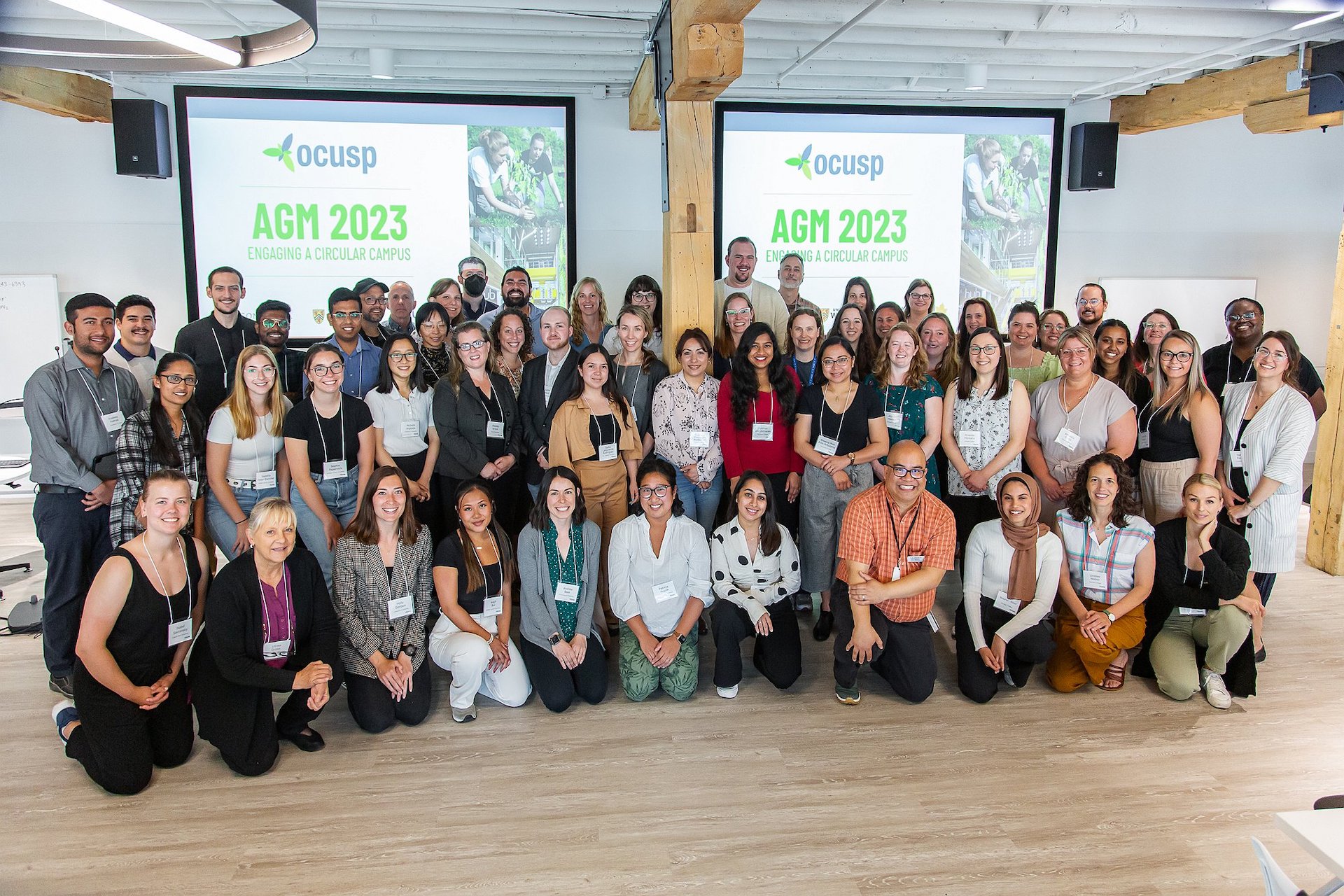Friday, September 26, 2025
The Ontario College and University Sustainability Professionals (OCUSP) network has long been at the forefront of sustainability leadership within Ontario’s post-secondary sector. As a dynamic and growing collective of sustainability professionals, OCUSP continues to strengthen institutional impact by facilitating knowledge-sharing, fostering professional development, and advocating for meaningful sustainability initiatives, projects, and policies. With a membership base now exceeding 100 professionals across 35 campuses, OCUSP continues to serve as a vital resource for individuals seeking to advance sustainability efforts within their respective institutions.
As part of a newly established media partnership with Environmental Journal, OCUSP is launching a dedicated showcase series—Spotlight on Sustainability—designed to highlight institutional sustainability success stories. This initiative will provide a platform to share best practices, amplify impact, and reinforce the value of collaboration in advancing sustainability outcomes. The series will underscore the collective expertise of OCUSP members, offering a lens into the tangible progress being made across Ontario’s college and university campuses.
The origins of OCUSP trace back to 2008, a pivotal moment when sustainability gained broader attention within various institutions in Ontario. With the rise of LEED certification, the growing influence of climate-focused policies, and an increasing demand for environmental accountability, a small group of campus sustainability professionals recognized the need for a centralized network. Since inception, OCUSP has evolved from an informal knowledge-sharing forum into a structured and influential body that provides members with the opportunity to exchange ideas, benchmark institutional progress, and develop coordinated approaches to sustainability challenges.
The OCUSP Mission
At the core of OCUSP’s mission is the commitment to fostering collaboration among sustainability professionals. Monthly membership meetings, subject-section working groups focused on data reporting and circular economy related initiatives, and lunch-and-learn sessions serve as opportunities for members to connect, share insights, and discuss emerging trends. A dedicated membership listserv and an evolving online resource hub further enable ongoing engagement and accessibility to critical sustainability information.
During the 2024 Annual General Meeting (AGM), members reflected on the value of OCUSP as a space for professional support, emphasizing that the network has become an essential forum for those working to integrate sustainability into post-secondary education, with an emphasis to pursue collective action and mobilization at the institutional level in the near future.
Current Campus Initiatives and Institutional Leadership
Among the initiatives currently shaping OCUSP’s direction are projects that focus on decarbonization, circular economy principles, institutional collective action and mobilization, and growing community partnerships. One of the more significant collaborative efforts in 2024 has been the participation of twelve post-secondary institutions in the Independent Electricity System Operator (IESO) Strategic Energy Management institutional cohort, an initiative aimed at accelerating energy efficiency improvements.
Additionally, OCUSP has begun working with the Ontario Library Association on strategies to reduce the environmental footprint of archives management and strengthen the overall resiliency, reinforcing the potential for sustainability integration beyond traditional campus operations. Other ongoing efforts include providing institutional feedback into the AASHE STARS program to enlist a Canadian institutional lens on future versions of the rating standard and a continued focus on proactive regulatory compliance through engagement with the Resource Productivity and Recovery Authority (RPRA) and the Government of Ontario.
A significant aspect of OCUSP’s work involves benchmarking and recognizing sustainability achievements through frameworks like the Sustainability Tracking, Assessment & Rating System (STARS) developed by the Association for the Advancement of Sustainability in Higher Education (AASHE). STARS provides a comprehensive platform for institutions to measure, report, and strengthen their sustainability performance across various domains, including academics, engagement, operations, planning, and innovation. Many OCUSP member institutions have participated in STARS, attaining various levels of recognition that reflect their commitment to sustainability.
The 2024 AGM also placed significant emphasis on the future of collective action within the growing professional network. Through both in-person and virtual discussions, members identified emerging opportunities for collaboration, including expanded sustainability research partnerships, new approaches to waste reduction and resource efficiency, and enhanced engagement with institutional procurement leaders.
Sustainability Programs Across the Province
The following list includes hyperlinks to the sustainability programs for OCUSP member institutions: Algonquin College, Brock University, Canadore College, Carleton University, Centennial College, Conestoga College, Confederation College, Durham College, Fanshawe College, George Brown College, Georgian College, Humber College, Lakehead University, Lambton College, McMaster University, Mohawk College, Niagara College, OCAD University, Ontario Tech University, Queen’s University, Seneca Polytechnic , Sheridan College, St. Lawrence College, Toronto Metropolitan University , Trent University , University of Ottawa, University of Toronto Mississauga, University of Toronto Scarborough, University of Toronto St. George , University of Toronto, Trinity College, University of Waterloo, University of Windsor, Western University, Wilfrid Laurier University, York University .
Strategic Steps for Collective Action
One of the defining aspects of OCUSP’s growth has been the increasing diversity of roles represented within its membership. While the network originally consisted primarily of sustainability coordinators and facilities managers, it now includes professionals working in energy management, communications, curriculum development, and student engagement, while expanding expertise in Equity, Diversity, and Inclusion-focused and Indigenous-themed capacity.
This multidisciplinary approach has strengthened OCUSP’s ability to address complex sustainability challenges from multiple perspectives, fostering a more holistic approach to institutional sustainability. Members have consistently expressed that the most valuable aspects of OCUSP membership are the opportunities for knowledge exchange, networking, and professional support. In response to this feedback, the network is actively enhancing its online presence and developing a comprehensive repository of sustainability resources that will further support members in their work.
As OCUSP moves forward, the long-term emphasis remains on amplifying institutional impact through collective knowledge and action, while finding creative ways to mobilize students, staff, and faculty within each institutional community. The network’s role as a hub for sustainability leadership is more important than ever, particularly as institutions navigate evolving regulatory landscapes, climate action commitments, resource capacity restraints, and the integration of sustainability into academic programming.
The collaboration with Environmental Journal marks a significant milestone in OCUSP’s evolution, providing a platform to share the successes, challenges, and innovations that define sustainability efforts across Ontario’s post-secondary sector.
OCUSP exemplifies the power of collaboration in advancing sustainability within higher education. Through strategic partnerships, shared resources, and a commitment to collective action, the network continues to be a catalyst for environmental stewardship and innovation. As OCUSP embarks on this new chapter, the stories and successes of its members will undoubtedly inspire and guide the broader sustainability community toward a more sustainable and resilient future.

Eric Meliton is a thought leader and industry conduit with over 20 years of strategic experience, which includes analyzing cleantech trends, execution of sustainability-themed objectives, and strengthening of stakeholder and governmental relationships. Meliton’s role at Wilfrid Laurier University is to provide sustainability leadership in a collaborative, multi-campus environment in Brantford, Kitchener, Milton, and Waterloo. He currently serves as the co-chair (Universities) for the Ontario College and University Sustainability Professionals network.
*Don’t miss the next Spotlight on Sustainability column! Sign up for your free subscription here.














